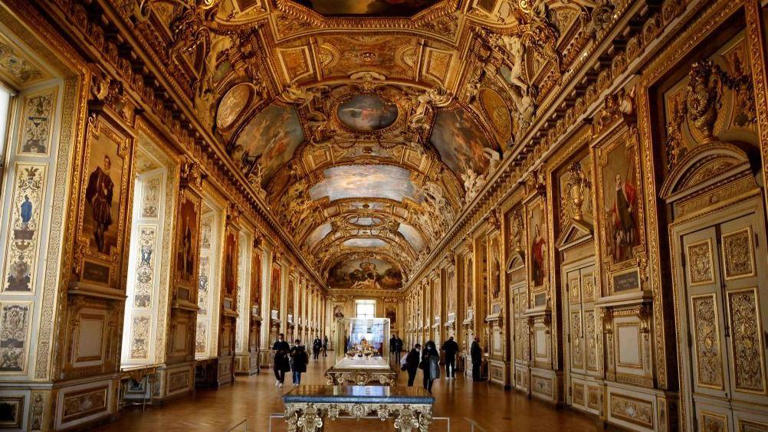
The robbers reached a first-floor window and cut through glass panes to gain access to the gold-gilded Apollon Wing. Image credit: Getty Images
(The Post News) – French legislators are asking whether the country’s most renowned cultural institution was sufficiently protected after the horrific daylight theft at the Louvre Museum on Sunday, which saw criminals make off with eight valuable French Crown Jewels. Many French lawmakers criticised the theft as a national tragedy and an “unbearable humiliation,” citing the boldness of the criminals’ use of power equipment and a crane lift to gain entry to the large museum complex while visitors were inside.
Concern over the present security failure is not new. According to reports, the Louvre has been warned about its vulnerability for decades. In 1998, a former director named Pierre Rosenberg raised the alarm when an artwork was taken. More recently, Radio France allegedly leaked an internal government audit that revealed the museum’s security system to be “outdated and inadequate.” A third of the rooms in the Denon Wing, where the crime occurred, and 75% of the rooms in the Richelieu Wing reportedly lack CCTV cameras, according to the audit, which also identified other serious flaws. Modernisation efforts have also been “repeatedly postponed.”
Additionally, labor unions have openly expressed their displeasure at the constant deterioration of museum security due to staff cuts. Even while visitor numbers have increased over the previous 15 years, a total of 200 full-time positions have been cut back, a union source told AFP. In June, staff members staged a walkout to protest “understaffing,” and Green party deputy mayor David Belliard of Paris questioned on X why these security issues were “ignored by the museum management and the ministry.”
Experts are stunned that a low-tech approach, involving motorbikes, a disc cutter, and a truck-mounted ladder, could effectively breach the barriers of such an iconic location. The crime may “rewrite museum security protocols,” according to criminology professor Nikos Passas, because the “lift, cut and escape is just stunning.” Culture Minister Rachida Dati acknowledged that the robbers’ “particularly fast and brutal break-in” and the quick action of only five guards nearby were insufficient to halt the heist, although the Apollo Gallery’s security system did activate.
The incident underscores a broader vulnerability across French cultural sites. The Central Office for the Fight against Trafficking in Cultural Property noted that museums are increasingly targeted and that their security “does not equal that of a bank.”
President Emmanuel Macron and Culture Minister Dati have announced that a portion of the colossal $930 million renovation project for the Louvre will be dedicated to a new “security master plan,” including the deployment of “new-generation cameras.”
However, attention remains focused on the fate of the stolen jewels. Art detective Alexandre Giquello told LCI that the famous treasures are “totally unsellable in their current state,” arguing the most complex challenge for the thieves is not the theft, but the “fencing.” This has led to the grim warning that if the robbers are not caught quickly, they may dismantle the historical pieces to sell the loose diamonds and metals, erasing their priceless heritage value forever.



